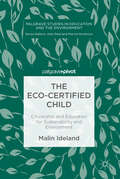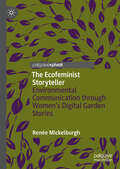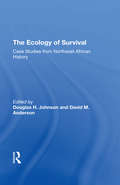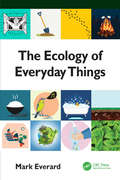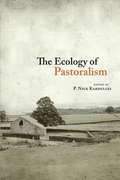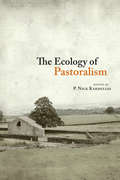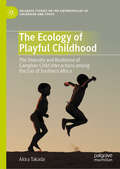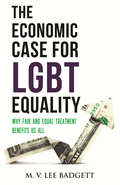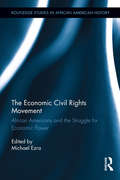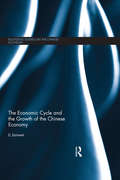- Table View
- List View
The Eco-Certified Child: Citizenship and Education for Sustainability and Environment (Palgrave Studies in Education and the Environment)
by Malin IdelandWhile few could dispute the need for Environmental and Sustainability Education (ESE) for children and young people, this book explores the problems inherent in this educational practice. Despite good intentions, the author highlights how ESE can in fact contribute to a (re)production of harmful norms and possible subjectivities by categorizing various groups as ‘threats’ to the environment. The author analyzes how these categorizations are entangled in historical discourses on social class, nationality and race, thus resulting in double gestures of inclusion and exclusion. Even as sustainability and environmental engagement becomes a treasured identity for the affluent, the author highlights that despite the best of intentions, the discourse of ESE can reinforce positions of suborder and superiority, which could even impede real change in the long run. This illuminating book will be of interest to students, scholars and practitioners of sustainability education.
The Eco-Social Polity?: Theoretical, Conceptual and Empirical Issues
by Ekaterina Domorenok, Paolo Graziano and Katharina ZimmermannThe devastating effects of climate change are undeniable. Fires rage and waters rise in every corner of the globe. In light of these changes to our planet, the issue of social and environmental wellbeing has gained prominent attention from both academia and policy makers. Scholarly research on the interaction between social and employment policy domains has flourished. Academics now reflect on the different aspects of environmental and social protection, ecological and social risks, and the costs of climate change, sustainable welfare and new social movements prompted by green transitions. This book provides a vital contribution to the emerging research agenda. It brings together scholars from interconnected disciplines to discuss the eco-social debate, providing a critical overview on extant scholarship and reflecting on future research pathways on the eco-social nexus from a variety of analytical perspectives.
The Ecofeminist Storyteller: Environmental Communication through Women's Digital Garden Stories
by Renée MickelburghThis book explores the way stories that emerge from the garden and are consumed in the digital space can become a nourished method of environmental communication. Mickelburgh seeks to understand what happens when some women speak, write, and photograph their private, everyday garden lives, and share those stories with a public, global, digital world. The garden is the place people get deeply acquainted with. This book considers Australian ecofeminist Val Plumwood’s urging for a “deep acquaintance with some place, or perhaps group of places” to discover a communicative “language of the land’’. The online world brings us into closer vicinity to this humble space, and yet a distance remains. This distance—the in-between—is the space where the possibility of communication lies. In keeping with its humble focus, this book asks simple questions of the garden. What happens when Australian women gardeners tell stories of community, care and compassion in a space that is both material and digital? Does digital soundwork, sightwork, and wordwork about gardens equate to communicative groundwork? This book tries to answer these questions by examining the digital stories of Australian women’s gardening lives. It aims to engage the reader through its emphasis on showing rather than telling the way affective communication circulates in the physical place, memories, the body, and the digital realm, in conversation with the many women writers and feminist scholars concerned with the entanglement of feminism, writing, the environment, and communication.
The Ecological City and the City Effect: Essays on the Urban Planning Requirements for the Sustainable City (Routledge Revivals)
by Franco ArchibugiFirst published in 1997, this volume responds to the increasingly urgent issue of degradation of the urban environment. It moves beyond the indirect environmentalism up until the 1990s, examining urban degradation and how urban planning can be directly applied to the concept of an ecological city. Particular focus is given to the Italian government’s ‘Urban Environment Programme’, a 10 year plan for the environment. Archibugi’s study forms part of an international monograph publishing series covering new research into the ‘green’ issues such as government, corporate and public responses to environmental hazards, the economics of green policies and the effectiveness of environmental protection programmes.
The Ecological Indian: Myth and History
by Shepard KrechThe idea of the Native American living in perfect harmony with nature is one of the most cherished contemporary myths. But how truthful is this larger-than-life image? According to anthropologist Shepard Krech, the first humans in North America demonstrated all of the intelligence, self-interest, flexibility, and ability to make mistakes of human beings anywhere. As Nicholas Lemann put it in , "Krech is more than just a conventional-wisdom overturner; he has a serious larger point to make. . . . Concepts like ecology, waste, preservation, and even the natural (as distinct from human) world are entirely anachronistic when applied to Indians in the days before the European settlement of North America. " "Offers a more complex portrait of Native American peoples, one that rejects mythologies, even those that both European and Native Americans might wish to embrace. "--
The Ecology Of Health And Disease In Ethiopia
by Helmut Kloos Zein Ahmed ZeinThis book examines prevailing human health problems in political, socioeconomic, cultural, and physical/biotic settings of health practitioners and planners in Ethiopia. It also evaluates modern and traditional health resources and examines the occurrence of nonvectored communicable diseases.
The Ecology Of Survival: Case Studies From Northeast African History
by Douglas H Johnson David M AndersonThis book is concerned with evaluating the antiquity of the domestication changes in northern Africa, considering the nature of the environments in which they arose, their social implications and the influence of climatic change on their later progress.
The Ecology of Childhood: How Our Changing World Threatens Children’s Rights (Families, Law, and Society #9)
by Barbara Bennett Woodhouse2021 Outstanding Academic Title, Choice MagazineHow globalization is undermining sustainable social environments for children This book uses the ecological model of child development together with ethnographic and comparative studies of two small villages, in Italy and the United States, as its framework for examining the well-being of children in the aftermath of the Great Recession. Global forces, far from being distant and abstract, are revealed as wreaking havoc in children’s environments even in economically advanced countries. Falling birth rates, deteriorating labor conditions, fraying safety nets, rising rates of child poverty, and a surge in racism and populism in Europe and the United States are explored in the petri dish of the village. Globalism’s discontents—unrestrained capitalism and technological change, rising inequality, mass migration, and the juggernaut of climate change—are rapidly destabilizing and degrading the social and physical environments necessary to our collective survival and well-being. This crisis demands a radical restructuring of our macrosystemic value systems. Woodhouse proposes an ecogenerist theory that asks whether our policies and politics foster environments in which children and families can flourish. It proposes, as a benchmark, the family-supportive human-rights principles of the UN Convention on the Rights of the Child. The book closes by highlighting ways in which individuals can engage at the local and regional levels in creating more just and sustainable worlds that are truly fit for children.
The Ecology of Everyday Things
by Mark EverardNature is all around us, in the beautiful but also in the unappealing and functional, and from the awe-inspiring to the mundane. It is vital that we learn to see the agency of the natural world in all things that make our lives possible, comfortable and profitable. The Ecology of Everyday Things pulls back the veil of our familiarity on a range of ‘everyday things’ that surround us, and which we perhaps take too much for granted. This key into the magic world of the everyday can enable us to take better account of our common natural inheritance. Professor James Longhurst, Assistant Vice Chancellor, University of the West of England (UWE Bristol) For many people, ecosystems may be a remote concept, yet we eat, drink, breathe and interface with them in every moment of our lives. In this engaging textbook, ecosystems scientist Dr. Mark Everard considers a diversity of ‘everyday things’, including fascinating facts about their ecological origins: from the tea we drink, to the things we wear, read and enjoy, to the ecology of communities and space flight, and the important roles played by germs and ‘unappealing creatures’ such as slugs and wasps. In today’s society, we are so umbilically connected to ecosystems that we fail to notice them, and this oversight blinds us to the unsustainability of everyday life and the industries and policy environment that supports it. The Ecology of Everyday Things takes the reader on an enlightening, fascinating voyage of discovery, all the while soundly rooted in robust science. It will stimulate awareness about how connected we all are to the natural world and its processes, and how important it is to learn to better treat our environment. Ideal for use in undergraduate- and school-level teaching, it will also interest, educate, engage and enthuse a wide range of less technical audiences.
The Ecology of Homicide: Race, Place, and Space in Postwar Philadelphia
by Eric C. SchneiderLike so many big cities in the United States, Philadelphia has suffered from a strikingly high murder rate over the past fifty years. Such tragic loss of life, as Eric C. Schneider demonstrates, does not occur randomly throughout the city; rather, murders have been racialized and spatialized, concentrated in the low-income African American populations living within particular neighborhoods. In The Ecology of Homicide, Schneider tracks the history of murder in Philadelphia during a critical period from World War II until the early 1980s, focusing on the years leading up to and immediately following the 1966 Miranda Supreme Court decision and the shift to easier gun access and the resulting spike in violence that followed.Examining the transcripts of nearly two hundred murder trials, The Ecology of Homicide presents the voices of victims and perpetrators of crime, as well as the enforcers of the law—using, to an unprecedented degree, the words of the people who were actually involved. In Schneider's hands, their perspectives produce an intimate record of what was happening on the streets of Philadelphia in the decades from 1940 until 1980, describing how race factored into everyday life, how corrosive crime was to the larger community, how the law intersected with every action of everyone involved, and, most critically, how individuals saw themselves and others. Schneider traces the ways in which low-income African American neighborhoods became ever more dangerous for those who lived there as the combined effects of concentrated poverty, economic disinvestment, and misguided policy accumulated to sustain and deepen what he calls an "ecology of violence," bound in place over time.Covering topics including gender, urban redevelopment, community involvement, children, and gangs, as well as the impact of violence perpetrated by and against police, The Ecology of Homicide is a powerful link between urban history and the contemporary city.
The Ecology of Language in Multilingual India: Voices of Women and Educators in the Himalayan Foothills (Palgrave Studies in Minority Languages and Communities)
by Cynthia GroffThis book explores the linguistic ecology of the Kumaun region of Uttarakhand, India through the experiences and discourses of minority youth and their educators. Providing in-depth examples of Indian multilingualism, this volume analyses how each language is valued in its own context; how national-level policies are appropriated and contested in local discourses; and how language and culture influence educational opportunities and identity negotiation for Kumauni young women. In doing so, the author examines how students and educators navigate a multilingual society with similarly diverse classroom practices. She simultaneously critiques the language and education system in modern India and highlights alternative perspectives on empowerment through the lens of a unique Gandhian educational context. This volume allows Kumauni women and their educators to take centre stage, and provides a thoughtful and nuanced insight into their minority language environment. This unique book is sure to appeal to students and scholars of multilingualism, sociolinguistics, language policy and minority languages.
The Ecology of Pastoralism
by P. Nick KarduliasIn The Ecology of Pastoralism, diverse contributions from archaeologists and ethnographers address pastoralism's significant impact on humanity's basic subsistence and survival, focusing on the network of social, political, and religious institutions existing within various societies dependent on animal husbandry.Pastoral peoples, both past and present, have organized their relationships with certain animals to maximize their ability to survive and adapt to a wide range of conditions over time. Contributors show that despite differences in landscape, environment, and administrative and political structures, these societies share a major characteristic--high flexibility. Based partially on the adaptability of various domestic animals to difficult environments and partially on the ability of people to establish networks allowing them to accommodate political, social, and economic needs, this flexibility is key to the survival of complex pastoral systems and serves as the connection among the varied cultures in the volume. In The Ecology of Pastoralism, a variety of case studies from a broad geographic sampling uses archaeological and contemporary data and offers a new perspective on the study of pastoralism, making this volume a valuable contribution to current research in the area.
The Ecology of Pastoralism
by P. Nick KarduliasIn The Ecology of Pastoralism, diverse contributions from archaeologists and ethnographers address pastoralism’s significant impact on humanity’s basic subsistence and survival, focusing on the network of social, political, and religious institutions existing within various societies dependent on animal husbandry. Pastoral peoples, both past and present, have organized their relationships with certain animals to maximize their ability to survive and adapt to a wide range of conditions over time. Contributors show that despite differences in landscape, environment, and administrative and political structures, these societies share a major characteristic—high flexibility. Based partially on the adaptability of various domestic animals to difficult environments and partially on the ability of people to establish networks allowing them to accommodate political, social, and economic needs, this flexibility is key to the survival of complex pastoral systems and serves as the connection among the varied cultures in the volume. In The Ecology of Pastoralism, a variety of case studies from a broad geographic sampling uses archaeological and contemporary data and offers a new perspective on the study of pastoralism, making this volume a valuable contribution to current research in the area.
The Ecology of Playful Childhood: The Diversity and Resilience of Caregiver-Child Interactions among the San of Southern Africa (Palgrave Studies on the Anthropology of Childhood and Youth)
by Akira TakadaWhile studies of San children have attained the peculiar status of having delineated the prototype for hunter-gatherer childhood, relatively few serious ethnographic studies of San children have been conducted since an initial flurry of research in the 1960s and 1970s. Based on the author’s long-term field research among several San groups of Southern Africa, this book reconsiders hunter-gatherer childhood using “play” as a key concept. Playfulness pervades the intricate practices of caregiver-child interactions among the San: immediately after birth, mothers have extremely close contact with their babies. In addition to the mother’s attentions, other people around the babies actively facilitate gymnastic behavior to soothe them. These distinctive caregiving behaviors indicate a loving, indulgent attitude towards infants. This also holds true for several language genres of the San that are used in early vocal communication. Children gradually become involved in various playful activities in groups of children of multiple ages, which is the major locus of their attachment after weaning; these playful activities show important similarities to the household and subsistence activities carried out by adults. Rejuvenating studies of San children and hunter-gatherer childhood and childrearing practices, this book aims to examine these issues in detail, ultimately providing a new perspective for the understanding of human sociality.
The Ecology of Power: Culture, Place and Personhood in the Southern Amazon, AD 1000–2000
by Michael J. HeckenbergerIn 1884 a community of Brazilians was "discovered" by the Western world. The Ecology of Power examines these indigenous people from the Upper Xingu region, a group who even today are one of the strongest examples of long-term cultural continuity. Drawing upon written and oral history, ethnography, and archaeology, Heckenberger addresses the difficult issues facing anthropologists today as they "uncover" the muted voices of indigenous peoples and provides a fascinating portrait of a unique community of people who have in a way become living cultural artifacts.
The Ecology of the Barí: Rainforest Horticulturalists of South America
by Stephen Beckerman Roberto LizarraldeInhabiting the rainforest of the southwest Maracaibo Basin, split by the border between Colombia and Venezuela, the Barí have survived centuries of incursions. Anthropologist Roberto Lizarralde began studying the Barí in 1960, when he made the first modern peaceful contact with this previously unreceptive people; he was joined by anthropologist Stephen Beckerman in 1970. The Ecology of the Barí showcases the findings of their singular long-term study. Detailing the Barí’s relations with natural and social environments, this work presents quantitative subsistence data unmatched elsewhere in anthropological publications. The authors’ lengthy longitudinal fieldwork provided the rare opportunity to study a tribal people before, during, and after their aboriginal patterns of subsistence and reproduction were eroded by the modern world. Of particular interest is the book’s exploration of partible paternity—the widespread belief in lowland South America that a child can have more than one biological father. The study illustrates its quantitative findings with an in-depth biographical sketch of the remarkable life of an individual Barí woman and a history of Barí relations with outsiders, as well as a description of the rainforest environment that has informed all aspects of Barí history for the past five hundred years. Focusing on subsistence, defense, and reproduction, the chapters beautifully capture the Barí’s traditional culture and the loss represented by its substantial transformation over the past half-century.
The Ecology of the Spoken Word: Amazonian Storytelling and the Shamanism among the Napo Runa
by Michael Uzendoski Edith Felicia Calapucha-TapuyThis volume offers the first theoretical and experiential translation of Napo Runa mythology in English. Michael A. Uzendoski and Edith Felicia Calapucha-Tapuy present and analyze lowland Quichua speakers in the Napo province of Ecuador through narratives, songs, curing chants, and other oral performances, so readers may come to understand and appreciate Quichua aesthetic expression. Guiding readers into Quichua ways of thinking and being--in which language itself is only a part of a communicative world that includes plants, animals, and the landscape--Uzendoski and Calapucha-Tapuy weave exacting translations into an interpretive argument with theoretical implications for understanding oral traditions, literacy, new technologies, and language. A companion websiteoffers photos, audio files, and videos of original performances illustrates the beauty and complexity of Amazonian Quichua poetic expressions.
The Economic Case for LGBT Equality: Why Fair and Equal Treatment Benefits Us All
by M. V. BadgettAn economist demonstrates how LGBT equality and inclusion within organizations increases their bottom line and allows for countries' economies to flourishWe know that homophobia harms LGBT individuals in many ways, but economist M. V. Lee Badgett argues that in addition to moral and human rights reasons for equality, we can now also make a financial argument. Finding that homophobia and transphobia cost 1% or more of a country's GDP, Badgett expertly uses recent research and statistics to analyze how these hostile practices and environments affect both the US and global economies.LGBT equality remains a persistent and pertinent issue. The continued passing of discriminatory laws, people being fired from jobs for their sexual orientation and/or gender identity, harassment and bullying in school, violence and hate crimes on the streets, exclusion from intolerant families, and health effects of stigma all make it incredibly difficult to live a good life. Examining the consequences of anti-LGBT practices across multiple countries, including the US, Canada, the UK, Australia, India and the Philippines, Badgett reveals the expensive repercussions of hate and discrimination, and how our economy loses when we miss out on the full benefit of LGBT people's potential contributions.
The Economic Case for Palestine (Routledge Library Editions: The Economy of the Middle East)
by Elias H. Tuma Haim Darin-DrabkinMuch has been written about the Arab–Israeli conflict, the prospects for peace or war and the eventual establishment of a Palestinian state, side by side with the state of Israel. The emphasis, however, has been on the political processes of such eventualities. The objectives of this book complement these previous efforts, the central concern being with the economic aspects of these various solutions. In particular, it is concerned with the economic feasibility of a state of Palestine. What minimum conditions must be met for it to survive and prosper? What size population can it support, what boundaries should it have and what period of time must elapse before the full potential and viability of such a state can be realized? The book is set in the context of the general theory of the economic feasibility of small nation states and the economic analysis is illustrated by comparison and contrast between countries from various regions and periods. The authors look in turn at appropriate boundaries for a Palestinian state, the people and land that will constitute it, the potential of the economy in terms of income, employment and investment, and also the Palestinian state within the regional context and the implications of making the Palestinian economy a part of the larger region of the Middle East. A final chapter summarizes the findings and notes the areas which require deeper study to appreciate the economic viability of the Palestinian state.
The Economic Causes of the English Civil War: Freedom of Trade and the English Revolution
by George YerbyThis is a coordinated presentation of the economic basis of revolutionary change in 16th- and early-17th century England, addressing a crucial but neglected phase of historical development. It traces a transformation in the agrarian economy and substantiates the decisive scale on which this took place, showing how the new forms of occupation and practice on the land related to seminal changes in the general dynamics of commercial activity. An integrated, self-regulating national market generated new imperatives, particularly a demand for a right of freedom of trade from arbitrary exactions and restraints. This took political force through the special status that rights of consent had acquired in England, based on the rise of sovereign representative law following the Break with Rome. These associations were reflected in a distinctive merchant-gentry alliance, seeking to establish freedom of trade and representative control of public finance, through parliament. This produced a persistent challenge to royal prerogatives such as impositions from 1610 onwards. Parliamentary provision, especially legislation, came to be seen as essential to good government. These ambitions led to the first revolutionary measures of the Long Parliament in early 1641, establishing automatic parliaments and the normative force of freedom of trade.
The Economic Civil Rights Movement: African Americans and the Struggle for Economic Power (Routledge Studies in African American History #1)
by Michael EzraEconomic inequalities have been perhaps the most enduring problem facing African Americans since the civil rights movement, despite the attention they have received from activists. Although the civil rights movement dealt successfully with injustices like disenfranchisement and segregated public accommodations, economic disparities between blacks and whites remain sharp, and the wealth gap between the two groups has widened in the twenty-first century. The Economic Civil Rights Movement is a collection of thirteen original essays that analyze the significance of economic power to the black freedom struggle by exploring how African Americans fought for increased economic autonomy in an attempt to improve the quality of their lives. It covers a wide range of campaigns ranging from the World War II era through the civil rights and black power movements and beyond. The unfinished business of the civil rights movement primarily is economic. This book turns backward toward history to examine the ways African Americans have engaged this continuing challenge.
The Economic Consequences of the Gulf War
by Kamran MofidThe Iran-Iraq War were one of the longest and most devastating uninterrupted wars amongst modern nation states. It produced neither victor nor vanquished and left the regimes in both countries basically intact. However, it is clear that the domestic, regional and international repercussions of the war mean that 'going back' is not an option. Iraq owes too much to regain the lead it formerly held in economic performance and development levels. What then does reconstruction mean? In this book, Kamran Mofid counteracts the scant analysis to date of the economic consequences of the Gulf War by analysing its impact on both economies in terms of oil production, exports, foreign exchange earnings, non-defence foreign trade and agricultural performance. In the final section, Mofid brings together the component parts of the economic cost of the war to assign a dollar value to the devastation.
The Economic Cycle and the Growth of the Chinese Economy (Routledge Studies on the Chinese Economy)
by Li JianweiThe nature of the economic cycle has been a long-standing problem for economists, given much attention by especially Malthus, Marx and Keynes. Key questions include: What are the causes of the economic cycle? Are the causes endogenous or exogenous? and Why is the economic cycle irregular? Economists’ views on these matters have differed, some concluding that governments can intervene effectively to stimulate economic growth, while others argue that government intervention is ineffective and even harmful. This book explores the theory of the economic cycle in relation to economic growth in China, and especially in relation to income distribution and the demand for consumer durables. The book concludes that the cause of the economic cycle is endogenous, that the periodic fluctuation of economic growth and its dynamic equilibrium are natural aspects of the growth of the economy, and it puts forward a new model of the economic cycle which confidently predicts the future trajectory of China’s economic growth.
The Economic Dependency Trap: Breaking Free to Self-Reliance
by Calvin Helin2012 gold medal winner in the self-help category of the prestigious Ippy Awards This book offers effective strategies to help erase poverty. It advocates self-reliance, policy reform, and cultural awareness. Accountability is required from all: the middle class, the trust fund babies, and the underprivileged who see themselves as perpetual victims and have fallen into the entitlement trap. True blue prints are offered to rescue people from an economical slump and help them improve their lives, and re-obtain a sense of self-worth.
The Economic Development Process in the Middle East and North Africa: Economic Development Process In The Middle East And North Africa (Routledge Studies in Middle Eastern Economies)
by Alessandro Romagnoli Luisa MengoniOffering a comprehensive analysis of the development of economies in the Middle East and North Africa over the past half century, this book charts the progress of these countries through an examination of an Islamic model of economic development, reform processes, and economic integration. Far from being a simple process, economic development in the Middle East and North Africa is dependent on the interaction of a set of changing systems including; international relations, the political regime, economy, and society. By analysing these interdependent factors, The Economic Development Process in MENA seeks to provide answers to the most pressing issues facing the economies in this area. Providing an interpretation of regional development in light of dialectics between state and society, this book will be of value to students and scholars with an interest in the Middle East, Economics, and International Relations.
